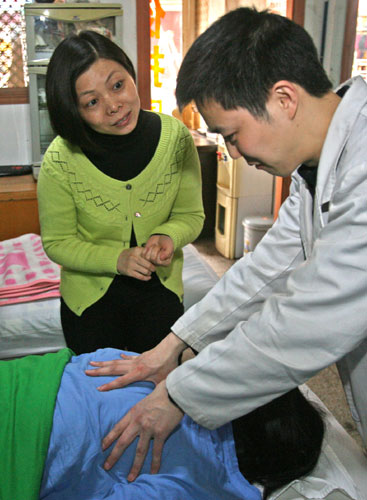With vision for the blind
Updated: 2011-03-08 08:57
By Wu Jiao (China Daily)
|
|||||||||||
 |
|
Xi Weijing talks with a graduate in this file photo. She often visits the workplaces of graduates to help them when they meet difficulties in work and life. [Photo/China Daily] |
BEIJING - Xi Weijing has a bright vision - not for herself but for millions of visually impaired children.
Xi, 44, a deputy to the ongoing 11th National People's Congress, told China Daily on the sideline of the congress that the government's blueprint for the next five years includes re-building and improving schools for physically challenged children.
| ||||
She has served as president of the Wuhu School for the Blind in Anhui province for 17 years. The private school enrolls blind students from all over the country.
The school was established by Xi's father, Xi Manqiao, in 1979.
Xi Manqiao, himself blind, set up the school with all of his savings after realizing that being a masseuse was one of the few suitable jobs for the blind, since they have sharper senses of touch and hearing.
When Xi Manqiao died in 1994 at the age of 50 from overwork, his daughter left her promising career in a large electric products corporation to be the second headmaster of the school.
Life has been hard, but Xi, who had been a crutch for her blind parents when she was a little girl, has deep sympathy for the blind.
"I just feel so much pity that when children around 10 years old come to my school and they can't even talk because their parents are so impoverished that time spent on teaching these blind children to talk is a luxury," said Xi.
"I feel the obligation to provide them with a place to learn something, to help them not only to stand on their own, but to help others and become a useful person in society. I want them to walk away from the shadow of being a burden and a useless person," Xi said.
Xi's determination to help the blind also comes from the fact that the disabled face difficulties getting access to schooling, let alone finding work.
Now, Xi's school teaches young children languages and other regular cultural courses. After graduation, they can learn massage skills, for which they must finish 25 courses within three years.
Teaching those students is different from teaching in ordinary schools.
According to Xi, besides science and art courses, she has asked all the teachers to pass the national psychological tests to help the children - who are often sensitive and more introverted - to build up their confidence and self esteem.
Now, instead of persuading families to send their blind children to the school, as her father had to do, more than 500 students apply every year from all over the country.
But the school, with 36 professional teachers, can admit only 50-odd students a year. Over the past years, more than 1,200 students have graduated.
A new school is currently under construction and the government has set aside subsidies to support almost half of the 17 million yuan ($2.6 million) investment.
Xi said she is happy to see her efforts pay off.
Yi Ming, a female student in Xi's school during the 1990s, managed to get enrolled by a medical university in a neighboring city. Yi, who was the first visually impaired university student of Wuhu, now runs a massage clinic in the city.
"I cannot see anything, but being able to help others has brought me enormous happiness and makes me find the value of my life," Yi said.














